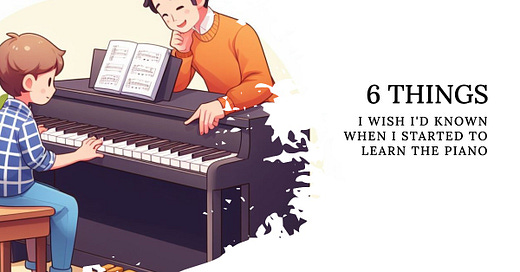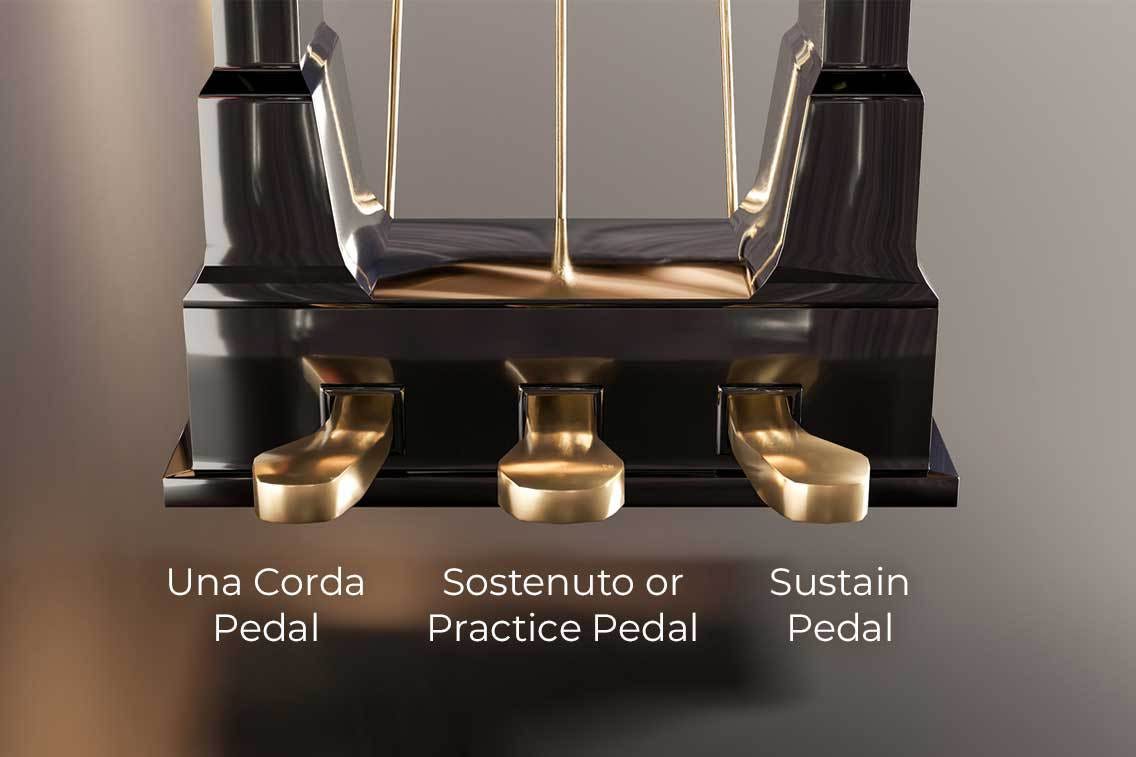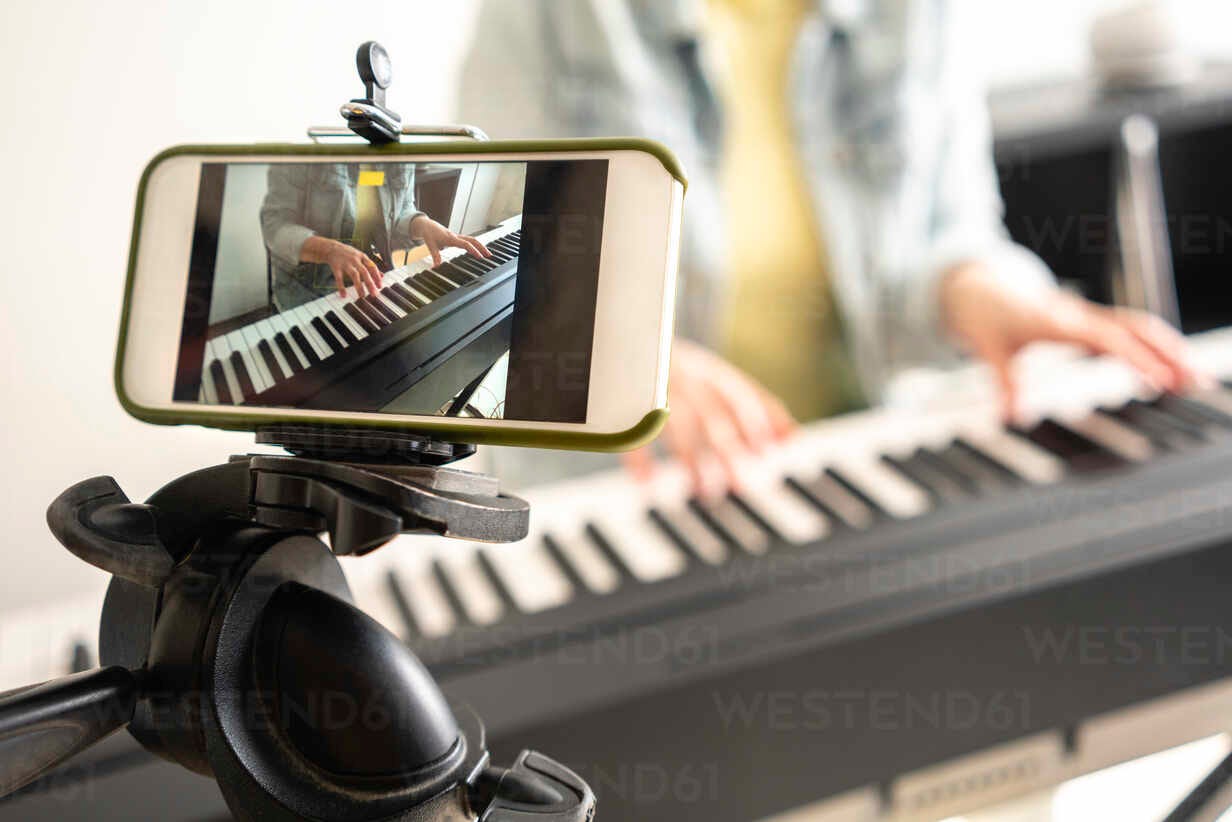6 Things I Wish I'd Known When I Started Learning Piano
Learning to play the piano can feel like an intimidating undertaking. The expanse of black and white keys in front of you represent a vast musical landscape filled with infinite possibilities.
Yet many who begin down the path of piano learning quickly find themselves lost, overwhelmed by the sheer scope of skills required. It's easy to lose motivation due to steep learning curves and slow progress.
As someone who has tread this road for 20 years, I assure you the effort is infinitely rewarding if you stick with it. But looking back, there are many things I wish I had known from the very first lesson that would have smoothed the way and accelerated my progress.
After nearly two decades at the piano, I've identified key lessons and techniques I could have benefited tremendously from as a beginner.
In this article, I want to share these six core insights with you so you can shortcut the long journey of trial and error. Implementing these methods early in your practice will help you sidestep many common frustrations and pitfalls holding aspiring pianists back.
Consider this your roadmap, helping you navigate the shortest path to success. Let my years of experience and experimentation guide you towards faster improvement and fewer wasted hours.
The path from beginner to mastery can be smooth. Arm yourself with the wisdom of those further down the road, and your progress will astonish you.
Let's explore these six tips I wish I had grasped early on. With an open mind and consistent effort, they will transform your relationship with the piano.
1. Practice Until You Can't Get it Wrong
One of the most common mistakes pianists make is stopping practice once they've correctly played a passage a single time. In their mind, nailing it once means they've mastered that section and can move on. This could not be further from the truth.
Playing a passage correctly one time after making multiple mistakes does little to cement the right notes and fingerings in your muscle memory. Your hands thrive on repetition - they become programmed to play flawlessly through consistent, error-free execution. Achieving the dexterity and automaticity needed for complex pieces requires extensive perfection of each component.
A passage flowing effortlessly off your fingers must be one you simply cannot get wrong anymore. The proper motions must be so deeply ingrained that mistakes become impossible. This level of flawless execution cannot be achieved through a single successful run. It requires playing correctly so many times that the wrong way is no longer even a possibility.
Practicing only until you get it right once is like trying to learn a language by memorizing a single correct sentence while saying other sentences incorrectly. Your brain needs far more positive reinforcement to lock in the proper words and phrases.
When I work with students, I emphasize practicing each passage until they literally cannot get it wrong. We repeat it with such focused consistency that the correct version is all their hands allow. This instills true technical and tactile mastery - the kind that will translate beautifully to the stage.
So resist the urge to rush ahead after one good repetition. Truly own each section by playing it perfectly over and over; far past the point, mistakes seem possible. Only then will your hands deliver a flawless performance reliably. With patience and diligence, you can practice any passage until the wrong notes recede from your muscle memory altogether.
If you still haven’t started your piano journey, start learning today with PianoForAll.
2. Limit Pedal Usage in Practice
The sustain pedal is an invaluable performance tool for pianists, allowing us to enrich the sonic palette and connect harmonic progressions. However, overuse of the pedal in practice can quickly become a crutch hiding sloppy technique. For this reason, I recommend limiting pedal usage substantially when learning new pieces.
Without the pedal to mask deficiencies, the naked sound exposes every unfinished element of your playing. Missing notes, uneven dynamics, rushed tempos, clumsy fingers - all become glaringly obvious sans pedal. You may be surprised just how reliant you've become on that pedal to compensate for flaws in raw playing ability.
This reliance on the pedal is detrimental for two key reasons. First, covering flaws with the pedal prevents you from identifying and addressing weaknesses in your fundamental technique. You can't fix issues you don't hear. The pedal lets you blithely bypass core piano skills, leading to inflated confidence and stalled development.
Second, proper pedal technique requires independence. If your fingers can't execute a passage cleanly and entirely independently, you haven't built the foundation necessary to layer on the pedal artfully. Mastering the unaided notes must come first.
This is why I urge students to lay off the pedal substantially during initial practice. Learn each piece with clarity and precision unmasked. Only after technical mastery should the pedal be incorporated with intentionality. This builds true pianistic independence rather than covering for insufficiencies.
Don't misunderstand - the pedal is vital for musical expression. But relied upon too heavily in practice, it becomes a limiting crutch. Challenge yourself to put in the work to play skillfully, even with the pedal stripped away. This will transform you into a consummate, independent pianist ready to utilize the pedal's full potential.
3. Practice Daily, Even in Small Increments
When learning piano, it's easy to think you must practice for hours at a time to see meaningful improvement. In reality, short but very consistent daily practice is far more effective than sporadic marathon sessions.
Even just 15 focused minutes daily is enough to cement gains and nurture progress. The key is regularity rather than quantity. Just a few minutes of mindful practice daily builds skills exponentially compared to a single weekly 3-hour session.
This is because the brain reinforces piano techniques through consistent repetition. Gaps between practices allow atrophy as the neural pathways formed start fading. Daily practice, even in small doses, keeps those pathways engaged and thriving.
It also prevents you from having to relearn material from scratch each time you sit down at the piano. Smooth incremental progress relies on picking up where you left off at the previous session. Extended breaks force you to backtrack and reacquire lost ground.
When motivation lags, recognize that a 15-minute session is still worthwhile. Don't skip practice just because you can't commit hours. Even basic warm-ups, exercises, and technique drills during quick sessions maintain abilities.
Think compounds interest - minor daily improvements accumulate into vastly superior skills over months and years of steady practice. A tiny 1% gain daily equals a 37X increase after a year!
So whenever you're feeling discouraged, remember – even a focused quarter-hour is enough to continue your piano progress. Stay consistent with manageable daily increments rather than erratic marathon sessions. This regularity will pay dividends.
4. Record Yourself
When practicing piano, it's easy to get caught up in the technical challenges and lose sight of how you actually sound. In the moment, the majority of your mental bandwidth is devoted to playing the right notes with proper technique and expression. Only a fraction remains to monitor your sound objectively.
This is why regularly recording your practice sessions is invaluable. Listening back to recordings of your playing allows you to critique yourself with fresh ears - to hear it as the audience hears it.
With no need to focus on the physical act of playing, 100% of your attention can be dedicated to analyzing areas needing improvement. Take trills, for example - when executing the rapid notes, most of your concentration is directed inward to your fingers. But when listening back, you can evaluate if the trill sounds evenly fast or uneven and needs more work.
Having an accurate picture of how your playing comes across is crucial for identifying deficiencies and tracking progress. Without recordings, it's easy to overlook issues like unclear voices, uneven tempos, muddy pedaling, and more. The gap between your internal sense and external sound can be shocking.
That's why I record myself frequently, both during practice and after playing a piece to the best of my current ability. I'll even record the same section multiple times as I'm honing it so I can directly compare and see the improvements.
These recordings become invaluable feedback I can use to perfect every future repetition. I always encourage students to embrace recording as well, even if just on the phone - that unfiltered playback is the best teacher. Don't just trust your instincts - use recordings to hear your playing with a critic's ear. This will accelerate your progress tremendously.
5. Follow Printed Fingerings
When starting out on piano, it's tempting to experiment with your own fingerings as you learn new pieces. However, I've found it better to follow the specific fingerings indicated in sheet music edits. Here's why this is beneficial:
Published scores with printed fingerings have been carefully edited by experienced pianists and pedagogues. They have already analyzed the most efficient and ergonomic way to play each passage based on hand shape and the technical skills required.
Rather than reinventing the wheel, please take advantage of their expertise. The suggested fingerings allow you to build muscle memory and neural pathways optimally from the start. Attempting your random fingerings often introduces tension and awkward transitions that become hard to unlearn later.
Printed fingerings also aid memory by associating certain passages with specific finger combinations. This makes recalling the piece and adequately preparing your hand easier. When you diverge from consistent fingerings, you lose this support structure.
Of course, everyone's hands are structured slightly differently. As you advance, you may tweak some fingerings to suit your unique physiology better. But when starting, trust the sheet music guides.
Think of it like painting a room in your home. The primer coat creates an ideal foundation. Only after it has thoroughly dried should you consider adding personal touches with additional paint layers.
Piano fingerings are similar. Master the basics using the editions' primer coat before customizing. This will provide the solid base technique upon which to build your skill and individuality.
6. Slow Down and Practice Mindfully
When starting a new piece, it's tempting to play hands together at full speed right away. Resist this urge! Slow, mindful practice is vital for accurately learning notes and technique.
Slowing down allows you to focus entirely on each individual note - its sound quality, articulation, and connection to the next note. At fast tempos, deficiencies get blurred together into a flood of information.
Practicing slowly lets you carefully polish every fine detail first with precision. Playing too fast too soon develops sloppy habits as your hands scramble to keep up before properly mastering each section.
Proper learning requires isolating and perfecting the smallest components first before combining them into a cohesive whole. The fastest way to learn a piece is by mastering it completely in small segments and then incrementally increasing tempo.
Slow practice may seem tedious, but you'll improve faster as flaws and inefficiencies are addressed, not glossed over. Be mindful and evaluative of every motion rather than rushing ahead.
Only graduate tempo up once a passage is flawless at slower speeds. If you maintain focus and patience, the work will pay off mightily. Pieces learned slowly and correctly from the outset require far less remedial practice later to correct ingrained mistakes.
Resist the urge for speed. Embrace the power of slowing down, perfecting each minute element with mindfulness and intention. This will provide a technical and artistic foundation enabling true musicality.
That’s it!
The piano is equal parts art and science. Mastering it requires both inspiration and discipline. I hope that by sharing key lessons from my 20 years of experience, you can deepen your passion while accelerating progress.
Implementing even one or two of these tips, from studying theory to recording your practice, can make a monumental difference over time. Approach the instrument with curiosity, patience, and purposeful practice.
This journey has no true destination – we never stop learning and improving. But armed with the right mindsets and techniques early on, you can avoid needless frustration. Keep pushing your skills while retaining a beginner's openness and enthusiasm.
Though the road is long, it is traversed step by step. Know that your love for the piano will continue growing, as will your abilities if you stick with it. Trust in the process, acknowledge each little victory, and play on!







